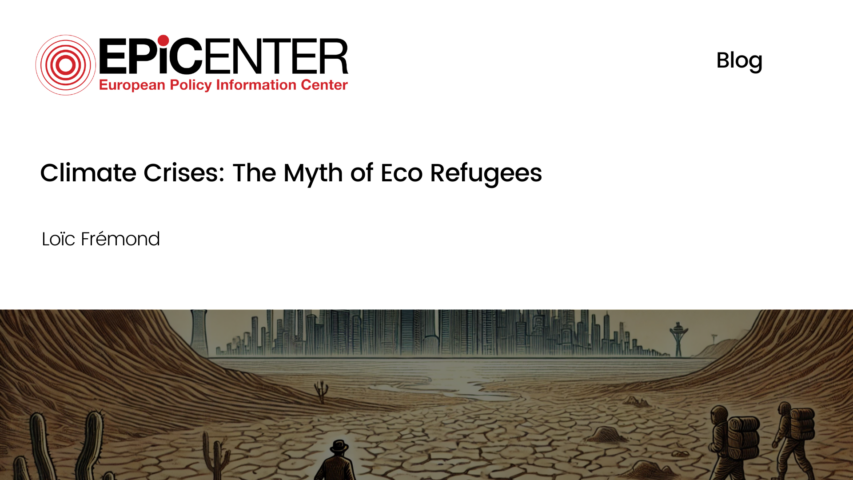Climate Crises: The Myth of Eco Refugees

Climate Crises: the Myth of Eco Refugees
Loïc Frémond // 27 January 2020
On 2nd December 2019, delegations from the United Nations convened in Madrid for COP25, the 25th annual Climate Change Conference. They gathered to discuss what is currently being done to counteract the effects of climate change. This is but one of many such conferences, regularly taking place across the world, as governments scramble to find a solution. Climate change has arguably usurped more traditional concerns, such as peace or trade, as the most prescient political issue.
As a result of this growing public consciousness, climate change has seeped into every aspect of society. This includes academics and researchers, political activists, and even providers of goods and services. This has been accompanied by an ever-intensifying amount of media coverage, as stories of wildfires, floods, droughts, and rising temperatures regularly feature in the headlines.
Climate change is therefore not just an environmental issue, it is an everything issue. Rising global average temperatures impact almost every aspect of modern society, regardless of region, development, or class – and for some, global migration is no exception in this matter. In particular, the ongoing bushfires in Australia have drawn attention to the question of how climatic conditions could affect future global migration patterns.
A recent World Bank study predicted that over 140 million people will migrate within their countries’ borders due to climate change by 2050. Factors included growing water scarcity, frequent droughts, crop failures, and ultimately, desertification (where farmers are forced to leave their no longer arable land).
In response, governments are now trying to introduce bills to address the looming problem of climate refugees. The UN’s Convention on Climate Change even explicitly specifies the need to avert, minimise and address climate displacement. However, this implies that migration is an issue that needs to be dealt with and oversimplifies the reasons that push individuals to leave their homelands. It also assumes that, were it not for climate change, these individuals might not still have left.
These claims lack the solid empirical foundations to stand up to scrutiny. However, they have still served to spur a powerful fear-mongering anti-immigrant narrative touted by far-right parties. Such parties have gained momentum in the wake of the 2016 migrant crisis, even getting voted into power in several EU member countries including Hungary, Italy, Austria, and Poland., They have done so by promoting hard border policies – France’s Rassemblement Nationale even claimed that “Borders are the environment’s greatest ally”.
However, even if the claims about climate displacement were true, strict border policies are not an effective method of obtaining desired immigration outcomes. EU Member States have been unable to reduce illegal migration finding that those who are intent upon entering will find a way to do so.
More importantly, the more nuanced reality is that people migrate for a variety of reasons and it cannot be simply reduced to a single motivation. As a sociological phenomenon, migration is the byproduct of a complex web of socioeconomic factors, variables which differ across different groups and locations. Concretely, migration has historically been observed to occur in times of economic growth. In particular, it has been observed when agriculture-based economies diversify, and individuals seek new opportunities in education and employment, seeking an improved quality of life.
These motivations can of course be exacerbated by climate change, especially insofar as it undermines economic growth and puts vulnerable communities at risk. Yet it is near impossible to disentangle climate change from a host of other stresses, such as the barriers to sustainable intensification in agriculture, population growth, and exhaustive stress on local resources.
In truth, there is insufficient data to make any serious claims linking climate change and long-term migration patterns. This is mostly because the data is so recent. In time, as trends in the data become more apparent, it may in fact be possible to draw such conclusions with greater confidence. Until then, processes such as desertification have little evidence to rest on.
However, there is evidence to suggest that migration can alleviate the stress on economies threatened by climate change. This can include improving agricultural development and sustainability, in part thanks to remittances, improving the food security in both the home and host countries, and balancing out climate-induced scarcity with human competition for resources.
A fresh approach is therefore needed. It should be one that relies upon empirical evidence rather than pandering to tribalistic sentiments. Rather than reinforcing a simplified myth of climate change migration as a looming security crisis, we must properly capture the complex and interrelated challenges of climate change and migration.
EPICENTER publications and contributions from our member think tanks are designed to promote the discussion of economic issues and the role of markets in solving economic and social problems. As with all EPICENTER publications, the views expressed here are those of the author and not EPICENTER or its member think tanks (which have no corporate view).



